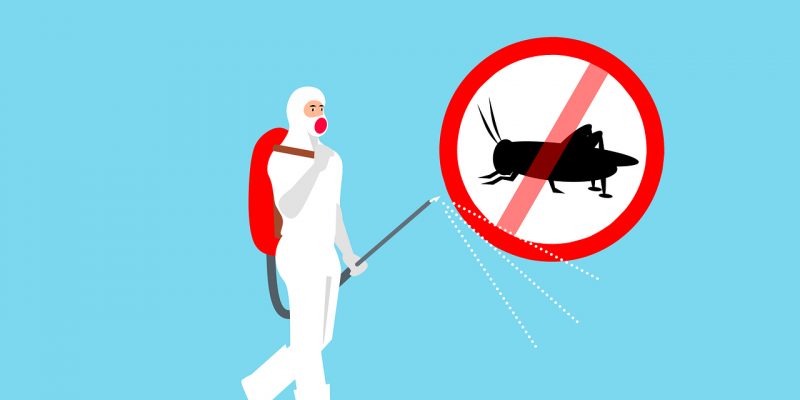Imagine coming home after a long day, ready to relax in the comfort of your own space. You kick off your shoes, settle into your favorite chair, and suddenly, you spot it – a creepy-crawly intruder making itself at home in your living room. It’s a scenario that can send shivers down anyone’s spine, but fear not! In our quest to maintain the sanctity of our homes, we’ve gathered invaluable insights from experts on how to bug-proof your living space. Whether you’re battling tiny nuisances like ants or facing larger foes like spiders, our tips and tricks will help you fortify your home against unwanted guests, ensuring your peace of mind and comfort. Without further ado, let’s get started.
Hire a Local Exterminator
When it comes to safeguarding your home against pests, enlisting the services of a local exterminator can be a game-changer. For instance, a local exterminator in Birmingham possesses a deep understanding of the specific pests plaguing your region, making them well-equipped to tackle infestations efficiently. Local exterminators also have access to the latest pest control technologies and environmentally friendly methods tailored to the local ecosystem.
Moreover, they can provide ongoing prevention strategies to keep bugs at bay long-term. By hiring a local exterminator, you not only ensure the effective removal of existing pests but also gain peace of mind, knowing your home is being protected by experts with a keen knowledge of the local pest landscape.
Seal Entry Points and Cracks
One of the fundamental strategies in bug-proofing your home is to meticulously seal entry points and cracks. Bugs can infiltrate through the tiniest openings, so identifying and sealing these vulnerabilities is crucial. Experts recommend a thorough inspection of doors, windows, foundation cracks, and utility penetrations. High-quality sealants and materials should be used, chosen based on the type of opening and the specific pests in your area.
Whether it’s weatherstripping gaps around doors or caulking cracks in the foundation, proper sealing not only keeps bugs out but also improves energy efficiency. DIY sealing can be effective, but for complex tasks or persistent infestations, consulting a professional is often advisable.
Deep Clean Your Home
Maintaining a clean and clutter-free living space is a powerful bug-proofing strategy endorsed by experts. A deep clean goes beyond regular surface cleaning, targeting hidden areas where pests can thrive. Focus on cleaning behind appliances, inside cabinets, and beneath furniture. Eliminate crumbs, food residues, and moisture sources, as these attract pests.
Experts recommend using natural cleaning agents like vinegar and baking soda to deter bugs without introducing harmful chemicals. Regularly wash and vacuum fabrics, rugs, and carpets, as they can harbor allergens and attract insects. By committing to a deep cleaning routine, you create an inhospitable environment for pests, reducing the likelihood of infestations.
Use Landscaping Strategies to Deter Bugs
Expert advice emphasizes the significance of landscaping in bug-proofing your property. Thoughtful landscaping can act as a natural barrier against pests. Planting insect-repelling plants such as marigolds, lavender, or citronella can help keep bugs at bay. Proper spacing and maintenance of trees and shrubs prevent them from becoming insect havens. Avoid overwatering to reduce moisture that attracts pests.
Install physical barriers like mulch or gravel to deter crawling insects. Additionally, consider the strategic placement of outdoor lighting, as certain bulbs can attract fewer bugs. By incorporating these landscaping strategies, you not only enhance your property’s aesthetics but also create a bug-resistant environment.
Proper Storage and Waste Management
Experts stress the importance of meticulous storage and waste management to prevent bug infestations. Properly sealed containers for food and pantry items are essential to thwart insects like ants and pantry moths. Regularly clean and organize storage areas to remove potential hiding spots for pests. In the kitchen, promptly fix any leaky pipes and faucets to eliminate moisture sources that attract bugs.
Managing garbage and compost effectively is crucial; use sealed bins, and maintain cleanliness to deter flies and rodents. Expert advice also includes not allowing pet food to sit out overnight, as it can attract a variety of pests. These practices collectively create an environment less conducive to bug infestations.
Create a Bug-Resistant Interior
To truly bug-proof your home, experts recommend taking steps to fortify your interior against potential invaders. Opt for bug-resistant materials and fabrics in your furnishings and decor. Consider insect screens for windows and doors to allow fresh air without welcoming pests. Carefully monitor and care for indoor plants, as the soil can be a breeding ground for bugs.
Expert advice also advocates for the use of non-toxic pest control methods indoors, such as traps or essential oils, to maintain a pest-free environment without resorting to harsh chemicals. By adopting these interior strategies, you can ensure your living spaces remain welcoming to you but unwelcoming to bugs.
Incorporating these expert-approved tips and tricks into your bug-proofing regimen can make a significant difference in safeguarding your home against unwanted pests. From sealing entry points and adopting landscaping strategies to diligent cleaning, storage practices, and interior precautions, you can create an environment that is less appealing to bugs. Whether you choose to implement these strategies individually or in combination, the goal remains the same: to enjoy a bug-free, comfortable living space, while simultaneously enhancing your home’s overall quality and cleanliness.





















